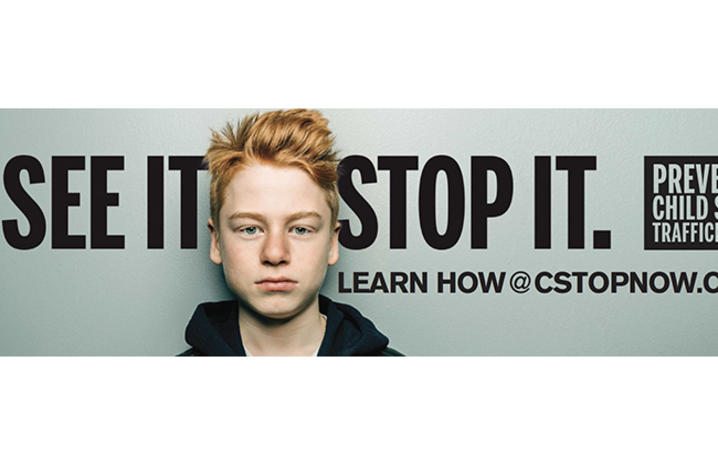New billboards across Kentucky part of UK study to prevent child sex trafficking

LEXINGTON, Ky. (March 3, 2023) — A team of researchers at the University of Kentucky is studying strategies to prevent child sex trafficking (CST) across the Commonwealth. The first phase of the project involves raising awareness about the issue.
Ann Coker, Ph.D., director of the UK Center for Research on Violence Against Women, and Ginny Sprang, Ph.D., director of the UK Center on Trauma and Children, are the principal investigators in the study funded by the Centers for Disease Control and Prevention (CDC).
“Child sex trafficking is a significant problem here in Kentucky. We know it is linked to substance use, particularly in family members. It is identifiable and it is preventable,” said Coker.
In 2021, Kentucky had the nation’s highest child abuse and neglect rate for the third consecutive year, according to statistics from the U.S. Department of Health & Human Services. The Commonwealth is also fourth nationwide for overdose deaths.
Strong risk factors for CST include a dysfunctional family environment characterized by violence and parental substance use. In Kentucky, familial sex trafficking is the more common form of CST. Children at higher risk of being sex trafficked are middle schoolers between ages 11 to 14.
The team of researchers is addressing the issue in two phases through the campaign “CSTOP Now!,” which encourages people to notice the signs of CST and take steps to stop it. In other words, “See It (CST) to Stop It.”
The first phase of this CDC-funded research involves a billboard campaign across Kentucky to raise awareness about child sex trafficking. More than two dozen Kentucky counties were randomly selected to receive billboards focused on preventing CST.
Researchers are asking any Kentuckians who see one of the billboards to visit CSTOPNOW.com to find more information about the risks, warning signs and resources for reporting CST.
As part of the second phase of the project, researchers will develop and test a training program for middle school staff that includes information on noticing signs of child sex trafficking in students, approaches to screening and providing resources for those at risk, and strategies to prevent trafficking in middle schools.
“What I’ve learned in working on this grant is that bringing CST to our collective attention is a concrete way to get bystanders engaged to see it, take action and stop it. CST is preventable and all Kentuckians can play a part in stopping it,” said Coker.
The project is bringing together researchers from the UK College of Medicine and College of Public Health along with experts at the University of North Carolina at Charlotte.
You can learn more about the study online here.
This project is supported by the Centers for Disease Control and Prevention (CDC) of the U.S. Department of Health and Human Services (HHS) as part of an award totaling $800,000 with 0% financed with non-governmental sources. The contents are those of the author(s) and do not necessarily represent the official views of, nor an endorsement, by CDC, HHS, or the U.S. Government. For more information, please visit CDC.gov.
As the state’s flagship, land-grant institution, the University of Kentucky exists to advance the Commonwealth. We do that by preparing the next generation of leaders — placing students at the heart of everything we do — and transforming the lives of Kentuckians through education, research and creative work, service and health care. We pride ourselves on being a catalyst for breakthroughs and a force for healing, a place where ingenuity unfolds. It's all made possible by our people — visionaries, disruptors and pioneers — who make up 200 academic programs, a $476.5 million research and development enterprise and a world-class medical center, all on one campus.




